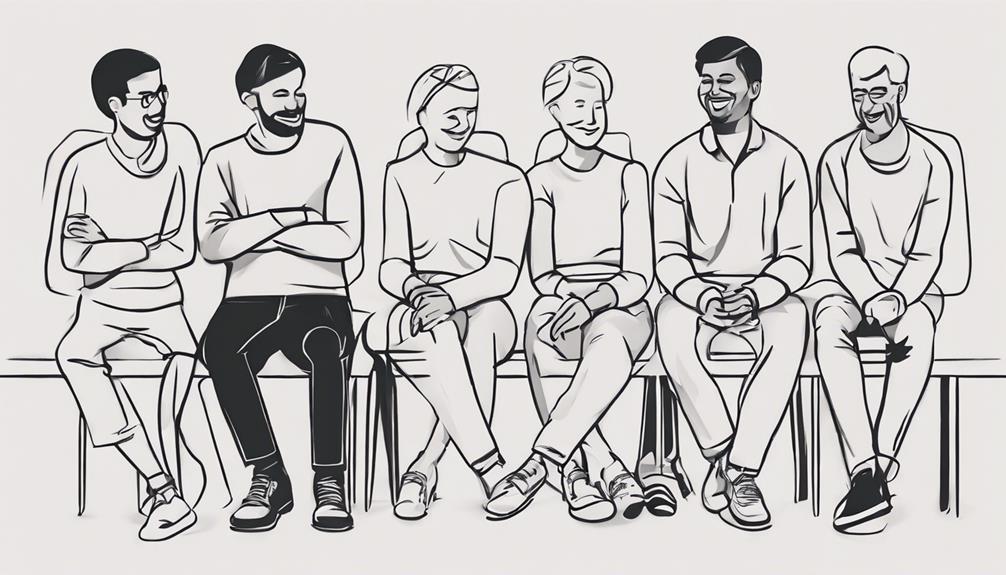Understanding others is a complex yet essential skill that can greatly impact our interactions and relationships. By delving into the nuances of empathy, communication, and self-awareness, we uncover layers of human connection that are often overlooked. Through a critical lens, we can explore practical strategies for enhancing our understanding of diverse perspectives and experiences, ultimately leading to a more harmonious and empathetic society.
Key Takeaways
- Foster empathy through active listening and self-reflection.
- Challenge biases, embrace diversity, and seek understanding.
- Cultivate curiosity, open-mindedness, and tolerance for others.
- Enhance communication, build trust, and promote interconnectedness.
Understanding the Importance of Empathy

Empathy, the capacity to comprehend and share the emotions of others, plays a pivotal role in fostering interconnectedness and emotional support within individuals and societies. The ability to understand and resonate with the experiences of others is fundamental in fostering connection and promoting personal growth. Recognizing the importance of empathy contributes to the establishment of a more compassionate society where individuals feel understood and valued. Empathy confirms one's identity and encourages positive interactions, creating a sense of belonging and acceptance.
Overcoming Bias and Prejudice
Overcoming Bias and Prejudice requires a conscious effort to recognize and address ingrained beliefs and attitudes that can hinder objective judgment and fair treatment of others. To achieve this, individuals must engage in self-reflection and education to understand the root causes of biases and prejudices. Challenging stereotypes and assumptions by actively seeking out diverse perspectives and experiences is crucial in broadening one's understanding and breaking down preconceived notions. Furthermore, practicing empathy and compassion towards others plays a vital role in counteracting the negative effects of bias and prejudice, fostering a more inclusive and accepting environment. By cultivating a mindset of openness and a willingness to learn from different cultures and backgrounds, individuals can actively work towards overcoming their biases and prejudices, ultimately promoting mutual understanding and respect among diverse groups.
Enhancing Communication Through Active Listening

Enhancing communication through active listening is a fundamental skill that fosters understanding and effective interpersonal interactions. Active listening encompasses more than just hearing; it involves fully concentrating on the speaker, grasping both the verbal and non-verbal cues, and providing feedback to ensure comprehension. By focusing on the speaker's words, emotions, and body language, individuals can better understand the message being conveyed, leading to enhanced empathy and improved communication skills.
Through active listening, individuals not only demonstrate respect for the speaker but also facilitate conflict resolution by encouraging open dialogue and mutual comprehension. This practice plays a crucial role in boosting productivity and nurturing positive relationships, as it helps in overcoming common communication barriers like distractions and misinterpretations. Developing active listening skills is essential for building trust and fostering a supportive environment where individuals feel heard and valued. By honing this skill, one can create meaningful connections and navigate conversations more effectively, ultimately leading to more harmonious interactions.
Cultivating Curiosity and Open-Mindedness
Cultivating curiosity and open-mindedness are essential traits for expanding one's knowledge and fostering a deeper understanding of the world around us. To achieve a greater level of understanding, individuals can focus on the following:
- Understanding Others: Curiosity and open-mindedness enable individuals to appreciate different perspectives and experiences, leading to a more profound comprehension of others' thoughts and emotions.
- Open Perspective: Embracing an open-minded outlook allows for the consideration of diverse viewpoints without bias, promoting empathy and tolerance in interactions.
- Asking Questions: Curiosity drives individuals to inquire, seek clarification, and delve deeper into various subjects, enhancing their knowledge and understanding.
- Listening Skills: Open-mindedness paired with active listening skills enables individuals to grasp different points of view effectively, including non-verbal cues like body language, contributing to a more comprehensive understanding of others' feelings and intentions.
Self-Reflection for Greater Understanding

Self-reflection serves as a fundamental practice for deepening comprehension and fostering empathy towards differing perspectives. Through self-reflection, individuals engage in introspection to examine their thoughts, feelings, and behaviors. This process enables the identification of biases, assumptions, and areas for personal growth in empathizing with and connecting to diverse viewpoints. By actively participating in self-reflection, individuals enhance their emotional intelligence, promote personal development, and expand their capacity for empathy and understanding of others.
Moreover, self-reflection allows individuals to explore their own experiences and beliefs, leading to a deeper understanding of oneself. This heightened self-awareness not only benefits personal growth but also improves the ability to comprehend and relate to others effectively. Embracing self-reflection as a continuous practice cultivates a mindset of openness, curiosity, and self-awareness in interactions with others. By acknowledging and addressing biases and preconceptions through self-reflection, individuals can develop a more profound understanding of others and foster greater empathy and compassion in their relationships.
Embracing Imperfections in Human Interactions
How can acknowledging imperfections in human interactions contribute to the development of empathy and the strengthening of interpersonal connections? Embracing imperfections in our interactions with others is crucial in understanding people better and building stronger relationships. Here are four ways embracing imperfections can enhance our level of understanding and empathy:
- Seeing Different Points of View: Acknowledging imperfections opens our minds to different perspectives, allowing us to understand others' viewpoints more deeply.
- Making Them Feel Accepted: By accepting imperfections, we make others feel validated and accepted for who they truly are, fostering trust and connection.
- Learning and Growing Together: Embracing imperfections means learning from mistakes and conflicts, leading to personal growth and stronger relationships over time.
- Creating Authentic Connections: Genuine interactions stem from accepting imperfections, creating a safe space for vulnerability and authenticity in relationships.
Applying Strategies for Building Empathy

To enhance interpersonal understanding and connection, implementing targeted strategies for fostering empathy is imperative in navigating complex human interactions. Empathy, a fundamental aspect of understanding people, can be cultivated through various practices. Active listening, a key component of empathy, involves giving undivided attention and demonstrating genuine interest in others' perspectives. By practicing active listening, individuals can show compassion and validate others' emotions, thus creating a sense of understanding and support. Additionally, asking open-ended questions can deepen one's understanding of others by encouraging them to share more about their thoughts and feelings. It is crucial to avoid making assumptions about others and their motivations, as this can hinder the development of empathy. Instead, seeking clarification and context can help in building a more accurate understanding of others. In essence, by incorporating these strategies into interactions, individuals can foster empathy and establish stronger connections with those around them.
Frequently Asked Questions
How Can You Be More Understanding?
To foster understanding, individuals must engage in active listening, empathy, and open-mindedness. By practicing perspective-taking and effective communication, one can cultivate non-judgmental attitudes and compassion. Self-awareness and humility are crucial in recognizing biases and fostering cultural sensitivity. Emotional intelligence aids in conflict resolution and promotes compromise. Incorporating these elements into interactions can lead to a deeper level of understanding and connection between individuals.
What Can I Do to Improve My Understanding?
To enhance understanding, individuals can engage in active listening, practice empathy, develop cultural awareness, receive open-mindedness training, cultivate patience, and improve communication skills. By prioritizing these aspects, one can deepen their understanding of others' perspectives, experiences, and emotions. Through a commitment to these practices, individuals can foster stronger connections, promote inclusivity, and contribute to more harmonious relationships in various personal and professional settings.
How Can I Understand More Better?
To understand more effectively, practice active listening, empathize with others, engage in mindful communication, develop cultural awareness, enhance emotional intelligence, undergo patience training, and engage in perspective taking. These strategies involve giving full attention, imagining oneself in another's situation, avoiding assumptions, seeking clarification, and embracing vulnerability. By incorporating these techniques, individuals can deepen their understanding of others and establish meaningful connections based on mutual respect and empathy.
How Can I Be Better Understood?
To be better understood, one must prioritize effective communication skills, active listening, and empathy practice. By cultivating emotional intelligence, taking others' perspectives, and maintaining a non-judgmental attitude, one can enhance understanding. Additionally, developing patience and clarity in expressing thoughts and feelings play a crucial role in being better understood by others. Are you willing to invest time and effort into honing these skills to improve mutual understanding and communication?
Conclusion
In a study conducted by the Harvard Business Review, it was found that employees who practice empathy in the workplace are 4 times more likely to be productive and engaged. Understanding others through empathy, active listening, and self-awareness is crucial for fostering harmonious relationships and creating a more compassionate society. By overcoming bias, enhancing communication, and cultivating curiosity, we can build stronger connections and improve our overall well-being. Embracing understanding as a strength benefits both individuals and society as a whole.
